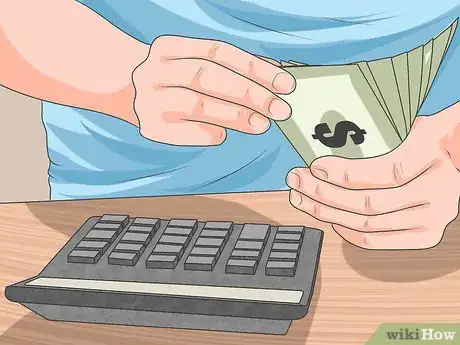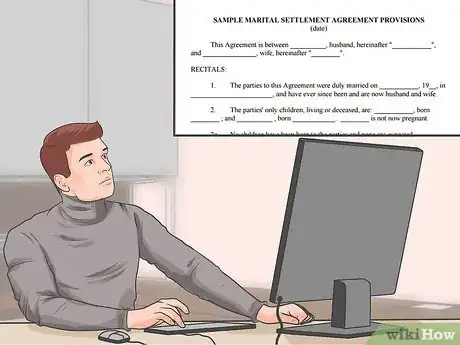This article was co-authored by Clinton M. Sandvick, JD, PhD. Clinton M. Sandvick worked as a civil litigator in California for over 7 years. He received his JD from the University of Wisconsin-Madison in 1998 and his PhD in American History from the University of Oregon in 2013.
There are 12 references cited in this article, which can be found at the bottom of the page.
wikiHow marks an article as reader-approved once it receives enough positive feedback. In this case, 90% of readers who voted found the article helpful, earning it our reader-approved status.
This article has been viewed 75,413 times.
Marital separation is never easy. You and your wife will both feel intense emotion, and you can expect plenty of tears and anger. However, in order to separate successfully from your wife, you need to first fully commit to separation. Then you can plan on breaking the news to your wife. As part of any separation, you need to begin untangling your financial situation and discuss child custody issues.
Steps
Telling Your Wife You Want to Separate
-
1Make a decision to separate. You need to be clear in your own mind that you want to separate before informing your wife. You can expect your discussion to be emotional. For that reason, you might back out of the separation. Before even mentioning separation, you need to be clear in your own mind that this is what you want to do.
- Remember that separation does not automatically mean you get divorced. Instead, separation could be a way for you and your wife to gain some perspective on your relationship.
- You can also “legally separate.” Legal separation is a form of long-term separation where you remain married. However, you and your wife would no longer be jointly responsible for finances and debts. For all intents and purposes, you live like a divorced couple.
-
2Come up with the details of separation. Separating isn’t as easy as walking out the door. You need to think through exactly what will happen before you drop the bomb on your wife. For example, you should consider the following:[1]
- Do you want to stay in the house or do you want her to leave? If you leave, where will you go? Does she have a place to go if you ask her to leave?
- Do you want the separation to be a temporary trial or permanent?
- Do you have access to important documents and information, such as birth certificates, financial account information, etc.? You should get this information first.
- Do you want to stay with the children? If so, you shouldn’t leave the house. You generally need a court order before you can take children out of their home.[2]
Advertisement -
3Write out a script to use. You will probably be nervous when you tell your wife that you want a separation. For this reason, you should write a script where you tell your spouse why you are leaving and also your expectations for the separation.
- Focus on using “I” statements instead of “you” statements. For example, “I think I’ve changed” is better than “You’re not the woman I thought you were.”
- Focus on why the marriage isn’t working for you and why you are leaving.[3] For example, you could say, “I’ve been married since I was 22 and think I need to find out what I really want. I think that might only happen if I spend some time on my own.”
- Avoid trying to convince your wife that the separation is a good idea for her, too. You can’t speak for her. For this reason, avoid saying, “You should take this time to figure out if you’re happy.” Instead, focus on your reasons for separating.
-
4Schedule a time to talk. It is better to schedule a specific time to talk about separating than to blurt out that you want to separate in the middle of a fight.[4] You should tell your spouse, “We need to talk about something important. Is now a good time?” If not, then ask to schedule a time to talk.[5]
- If you are afraid of your wife physically attacking you, then you might want to schedule a discussion in public. People often control themselves better when there are other people around.
- You should also realize that it may take your spouse a long time to just process what was said. For this reason, you may need to speak more than once to hammer out the details of your separation.
-
5Break the news. Try not to be defensive or aggressive when telling your wife that you want to separate. Instead, remember to go through your script slowly and pause to judge her reaction. She might immediately go into a state of shock and not really hear what you are saying.
- For example, you could say, “Mary, I need some time to figure out how I feel about our marriage. I think a separation will allow me to get some perspective on our relationship and on what I want. Maybe if we live separately for a while, we can sort things out.”[6]
-
6Don’t interrupt your wife. You need to listen to whatever your wife says in response to your request for a separation.[7] If she needs to vent, then let her vent. Also, if you think she is keeping emotions bottled inside, you could say, “Please, Sherry, I’m willing to listen to whatever you have to say.”
- When you interrupt someone, you invalidate what they are feeling. Your wife’s resentment could harden if she feels like you are trying to silence her. Let her talk, and make eye contact as she talks.
- Remember that separation is a process—you will probably see your wife frequently in the coming months and years, even if you don’t have children. It is best to try and be as understanding so that the separation can be as smooth as possible.
-
7Tell your children. Many couples never tell their children that they are separating, particularly when the children are very young. However, you need to tell your children. Remember to follow these rules:[8]
- Don’t blame. You don’t need to blame your wife for the separation. Don’t say, “Your mother has made it impossible for me to stay.” You could instead say: “I need to go away for a while to think things through.”
- Don’t overshare. Your children don’t need to know the details of why the marriage is not working out. In fact, the more children know, the more harm they suffer.
- Avoid asking the children who they want to stay with.
- Tell your children you love them and tell them that you will stay in constant contact. Tell them where you are staying and that you will see them soon.
-
8Leave, at least temporarily. It is probably easier to be the one who leaves the house. After talking about why you want to separate, you should leave. Give your wife your phone number so that she can talk to you.[9]
- Be sure not to leave with property you own together with your wife. She might think you are permanently trying to deprive her of it.
- Instead, pack a bag full of clothes and personal items, like toiletries or anything you will need to get through a week.
-
9Schedule therapy, if necessary. Because of the emotional toll separation can take on a family, you should consider therapy before, during, or after the separation. Therapy can help family members deal with the feelings of guilt, depression, and anxiety.[10] You should also have considered therapy as an alternative to separating.
- You can get a referral to a family or couples therapist by asking your family doctor.
- Some websites, such as Psychology Today, also have locators you can use. Type in your city or zip code to find therapists near you.[11]
Handling Finances
-
1Make a budget. Separating from a spouse almost always reduces your income and increases your expenses. Accordingly, you need to create a budget, preferably before you separate. You can make a budget with your wife. However, since you will be living alone, you really need to take control of financial decision-making yourself.
- Look at all sources of income. If you are staying with the children, you can expect child support payments from your wife. But these can take time to establish. Also, you should ideally manage to support yourself as best as you can without relying on your spouse.
- Take a hard look at your expenses. If you were used to splitting the cost of car insurance, food, and entertainment with your wife, you will now be entirely responsible for those. Your individual expenses could increase as a result.
-
2Save money. You will need a cushion to help you transition to your single life. Ideally, you should save at least three months of expenses. This amount will give you time to set up your new life.
-
3Cancel joint credit cards. Any balance on a joint credit card is generally the responsibility of both you and your wife. You want to make sure that no new expenses are added to the card. Call up the credit card company and ask that no new charges be allowed on the card. If necessary, you can close the card.
- You also should try to get a credit card in your own name. You should not use any joint card after you separate.
-
4Close joint bank accounts. Once you decide to separate, you don’t want your wife cleaning out the joint bank account. For this reason, you should move quickly to either close the account or require that both spouses provide signatures before money can be removed.
- Call up your bank and ask how you can limit withdrawals. Also cancel overdraft lines and lines of credit.
- Make sure to have any direct deposit routed to a new bank account. This may take some time to go through so start as soon as possible.
- If you need your wife to agree to close the account, then you should find a good time to talk and raise the issue with her. You could say, “Since we’re living apart, I think it would be a good idea for each of us to have our own bank account. This way we’ll each have a better sense of our expenses. I’ve talked to the bank and they need both of us to sign a form.”
Tackling Legal Issues
-
1Consult with a family law attorney. There are many legal issues involved with separating from your spouse. You are advised to meet with a family law attorney and discuss the separation. Each person’s separation is different, and only a qualified attorney can identify and untangle any legal issues.
- To find a family law attorney, you can contact your local or state bar association and ask for a referral.
- Once you have the name of an attorney, you should call and schedule a consultation. Ask ahead of time how much the attorney charges.
-
2Discuss child custody issues. You and your wife need to discuss who will take care of the children. Generally, it is best for the parent who stays in the house to have custody, since there is rarely a good reason to remove children from familiar surroundings.
- You might find it easier to leave the house but want to seek custody of your children at a later date. In this situation, you need to remain closely involved with your children.
- Make sure to visit often and also have your children frequently spend the night with you. In fact, you and your wife should draft a temporary child custody agreement. It does not need to be particularly detailed, but it should identify when each parent will have custody of the children.[12]
- You and your wife could also agree to divide your time in the home. For example, you could both pay to rent an apartment in town. On Mondays through Thursdays, you could stay in the apartment while your wife stays at home. On Fridays through Sundays, you could then stay in the home while your wife is in the apartment.
-
3Estimate child support payments. If you aren’t the person who will take care of your children, then you can expect to pay child support to your wife. You must pay child support even if you aren’t divorced.[13] There really isn’t any wriggle room for getting out of child support payments, so you might as well try to estimate how much you will have to pay each month.
- There are many online calculators you can use to estimate monthly support payments.[14] You enter information about your salary and the number of children that you have, and the calculator estimates your payments.
- See Calculate Child Support for more information.
-
4Get a restraining order, if necessary. Your wife may have abused you or the children. In these situations, you will need to get a restraining order. You can get a restraining order, also called a protective order, by stopping into your local courthouse and asking for the forms.
- See Get a Protective Order for more information.
-
5Decide whether to legally separate. Sometimes separation is temporary, but other times separation can be permanent. In some states, you can get a “legal separation,” which is like a divorce although you remain legally married. When you legally separate, you divide assets and debts just as divorced people do. You also settle on child custody arrangements.[15] You should discuss this option with your attorney and identify your reasons for seeking legal separation:
- You might want to stay married but legally separate if either you or your wife has a religious objection to divorce.
- Legal separation can also be helpful if one spouse needs to stay on the other’s insurance or if one spouse is close to qualifying for spousal Social Security benefits.
-
6Draft a marital separation agreement. You can begin the legal separation process by drafting a marital separation agreement, which is like a divorce settlement agreement. You and your wife agree on a division of assets, debts, child support, and spousal support (alimony).[16] Although you can create a marital separation agreement if you separate temporarily, they are more common for people who choose to permanently separate.
- The marital separation agreement becomes a contract between you and your wife. If either of you violate the agreement, the other could sue in court.
- You each should have your own attorney draft and look over the agreement.
References
- ↑ http://www.huffingtonpost.com/emily-gordon/youve-decided-to-leave-yo_b_1547142.html
- ↑ http://www.nelligan.ca/e/whatyoushouldknowbeforeyouseparatefromyourspouse.cfm
- ↑ http://www.huffingtonpost.com/emily-gordon/youve-decided-to-leave-yo_b_1547142.html
- ↑ http://www.huffingtonpost.com/emily-gordon/youve-decided-to-leave-yo_b_1547142.html
- ↑ http://www.divorcemag.com/articles/your-parting-words-how-to-break-the-news-responsibly
- ↑ http://www.divorcemag.com/articles/your-parting-words-how-to-break-the-news-responsibly
- ↑ http://www.divorcemag.com/articles/your-parting-words-how-to-break-the-news-responsibly
- ↑ http://www.kidspot.com.au/health/ask-the-expert/ask-dr-justin/how-to-tell-your-children-youre-separating
- ↑ http://www.huffingtonpost.com/emily-gordon/youve-decided-to-leave-yo_b_1547142.html
- ↑ http://www.goodtherapy.org/learn-about-therapy/issues/divorce
- ↑ https://therapists.psychologytoday.com/rms/
- ↑ http://www.attorneys.com/child-custody/child-custody-considerations-for-the-recently-separated
- ↑ http://info.legalzoom.com/divorced-pay-child-support-can-legally-separated-24859.html
- ↑ http://www.alllaw.com/calculators/childsupport
- ↑ http://www.divorcenet.com/resources/family/types-separation.htm
- ↑ http://www.nycbar.org/get-legal-help/article/family-law/marital-agreements/separation-agreement/
About This Article
Separating from your wife can be a tough time, but if you agree on domestic and financial issues, things will go a bit smoother. You’ll need to agree where you’ll both live, and if you have children, where they’ll stay. Keep in mind that you’ll generally need a court order to take your children out of their home. Once you’ve agreed on living arrangements, you’ll need to agree how any shared assets and debts will be distributed between you. At this point, you’ll want to close any joint bank accounts you share. You should also write a budget so you can keep track of your individual finances and any child support. To separate legally, you’ll need to file a marital separation agreement, which will legally bind you to your agreements about living, finances, and custody. For more tips from our Legal co-author, including how to decide whether to legally separate from your wife, read on.








































































